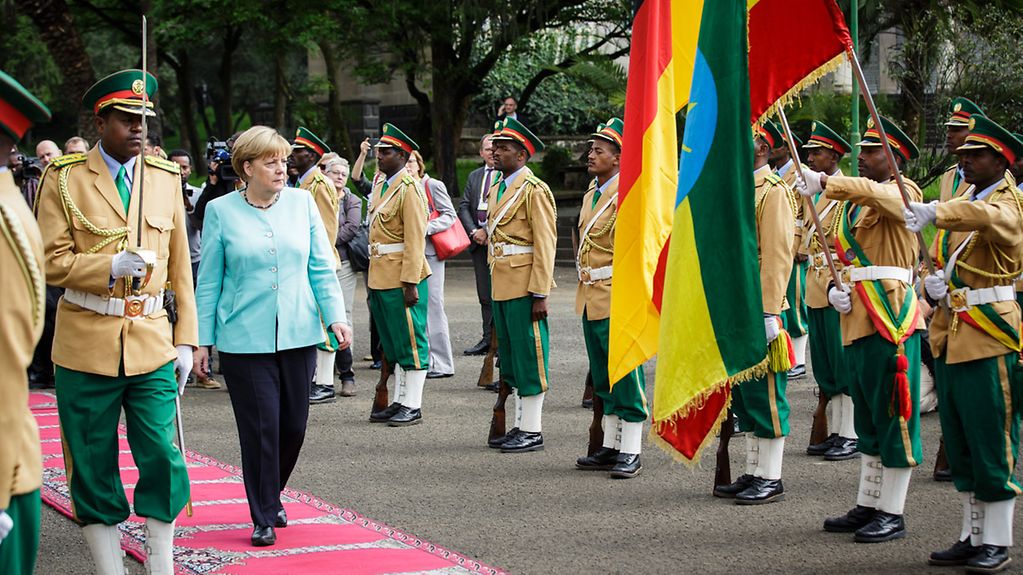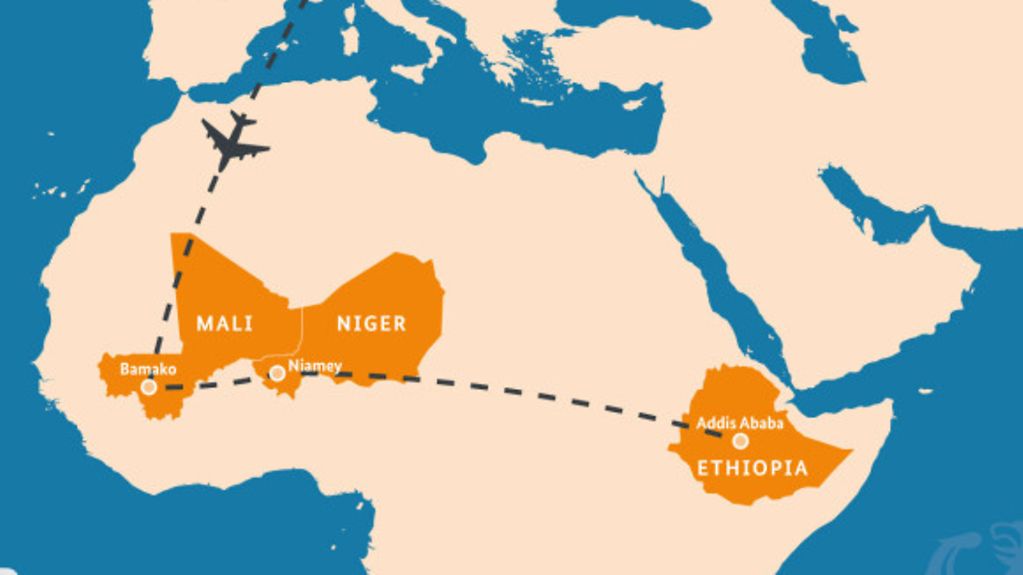The Chancellor's trip to Africa
During her visit to Ethiopia, Chancellor Angela Merkel has called for greater democracy and for conflicts to be resolved through dialogue. In Addis Ababa she met with Ethiopia’s Prime Minister Hailemariam Dessalegn and officially opened the new Peace and Security Building of the African Union.

Angela Merkel was welcomed with military honours in Addis Ababa
Photo: Bundesregierung/Steins
"Vibrant civil society is part of a developing society," said Chancellor Angela Merkel after her meeting with Ethiopian Prime Minister Hailemariam Dessalegn.
An exhausting political debate is better than "allowing conflicts to erupt into violence, with loss of lives and a growing hatred of and dissatisfaction with political institutions, such that at some point there is no longer any acceptance of the state and government," said Angela Merkel.
With a view to the continuing protests and the state of emergency in Ethiopia, she pointed to the importance of democracy and dialogue. "We are ready and willing to support Ethiopia on its way to building democracy, strengthening civil society, and strengthening the different political parties – including opposition parties." Angela Merkel offered German support for police training, to help devise de-escalation strategies.
Ethiopia as an anchor of stability
The Chancellor praised Ethiopia’s enormous generosity in taking in more than 700,000 refugees, most of whom have come across the borders from the neighbouring states of Eritrea, Somalia and South Sudan. She also made special mention of the country’s commitment to conflict resolution within the scope of military missions and the political process in the region. "Ethiopia is an anchor of stability and an example of successful economic development," she said.
The country needs support to finance military missions. "I will do what I can in Europe to ensure that cuts are not made to every mission, but to guarantee that the missions can go ahead," she stressed.
Germany will also continue to support Ethiopia through development cooperation and private investment. In this context Angela Merkel proposed bilateral economic talks in order to encourage German businesses to step up their investment in Ethiopia in future. The Chancellor also announced that the terms of investment in Africa would be one of the topics addressed during Germany’s G20 Presidency next year.
In Addis Ababa the Chancellor also met representatives of civil society organisations, which allowed her to find out more about several topics, including the political situation in Ethiopia.
Ethiopia is home to one of the world’s most ancient cultures. Germany first established diplomatic relations with the country in 1905. Ethiopia plays an important political and economic role in the Horn of Africa.

Stops on the Chancellor's trip
Photo: Bundesregierung
Peace and Security Building of the African Union opened
Later, the Chancellor met with African Union Commission Chairperson Dr Nkosazana Dlamini Zuma and other AU representatives.
Angela Merkel spoke at the inauguration of the African Union’s Julius Nyerere Peace and Security Building. The construction of the building was financed by the German Federal Foreign Office. It houses the plenary chamber for meetings of the AU’s Peace and Security Council, and combines local craftwork and German high tech construction techniques.
In her speech Angela Merkel declared that in the face of enormous global challenges like the financial and economic crisis, epidemics like Ebola, terrorist activities, and displacement and expulsion, the "African states must present as uniform a front as possible to advance their own shared interests – with a recognised partner like the African Union."
The new building is inextricably linked to the shared vision of achieving peace and greater security in Africa. This is "the essential precondition for living in dignity" stressed the Chancellor. In view of many difficult developments, the African Union and regional bodies that bring together affected states must stand up to terrorist organisations that care nothing for human dignity.
The Lake Chad region came in for special mention. This region has not only been hard hit by climate change, drought and over-exploitation, said the Chancellor, but also by the bloody campaign being waged by Boko Haram. This is why the European Union will provide 50 million euros to support the deployment of a multilateral intervention force.
Strengthening sustainable development
Angela Merkel also underlined the importance of sustainable development as a precondition for effectively tackling displacement and terrorist threats. She listed three central tasks on which Germany would be working within the framework of migration partnerships, in addition to humanitarian and development projects in the countries of origin of migrants and the transit countries they use:
- Enhancing private investment in order to generate sustainable growth and create jobs;
- Developing infrastructure, especially in the transport, communication and energy sectors;
- Improving vocational and technical education and training, to ensure that it responds better to the needs of the labour market and enhances the chances of those completing courses of finding a job.
Looking forward to Germany’s Presidency of the G20 next year, Angela Merkel underlined, "We will also make the issues that move you in Africa one of the focuses of the G20 agenda, and will be launching an extensive initiative with Africa."
Africa is a continent of the future, and as such of great interest to Germany and to Europe, the Chancellor continued. The African Union is the main driver of economic integration in Africa, and hence a key partner of the European Union.
The headquarters of the African Union are in Addis Ababa. Over the last few years the AU has increasingly been involved in resolving conflicts in the region. The central AU institution is the Peace and Security Council. Germany’s cooperation with the AU focuses on the fields of peace and security, economic integration, agriculture and infrastructure, trade, education, training and climate change. Over the last ten years Germany has provided a total of 500 million euros to support the AU.